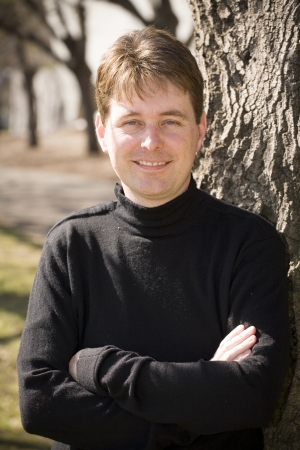Detecting the keys to wellbeing
Research news
Whether it be tracking the health and development of thousands of Australian children and young people, promoting children’s books that encourage emotional literacy, or developing mentor programs for secondary school students, Deakin’s Associate Professor Craig Olsson is passionate about making a difference to the wellbeing of Australians.
Associate Professor Olsson has recently been appointed Director of Deakin’s Centre for Mental Health and Wellbeing Research (CMHWR).
He brings to the position an intimate knowledge of numerous large scale epidemiological studies – and involvement in many intervention programs aimed at improving wellbeing.
One of the most significant of these studies is the Australian Temperament Project, of which he is Scientific Director and which is Australia’s longest-running longitudinal study of child development. Beginning in 1983, it has followed around 2000 people, from four months of age, through to adulthood and parenthood.
“Long-term studies such as these are key to informing successful interventions,” Prof Olsson explained.
“Unless you understand the foundations of emotional life, you can’t describe healthy development or know what’s going on when something goes awry, or know when and how you should intervene.”
As famously demonstrated by the “Seven Up” series, one of the key findings of Australia’s most long-standing longitudinal studies, he explains, is that “the foundations of a secure start to emotional life extend across the generations, and in some cases there is not a lot of intergenerational movement. So one of our major challenges is to find ways to break these cycles.”
Associate Professor Olsson has had a striking career since he completed his PhD in 2000. In 2013, he became the first Deakin academic to receive both an ARC Principal Research Fellowship and a prestigious ARC Discovery Outstanding Researcher Award.
Since he joined Deakin in 2011, he has received funding from the Australian Research Council and the National Health and Medical research Council to follow offspring born to participants of the Australian Temperament Project across the next five years. Assessments are made during pregnancy, at birth, eight weeks, 12 months postpartum, and at four years of age.
“Our offspring study is unique worldwide,” said Prof Olsson. “It will allow us to understand how patterns of mental health and wellbeing are passed down across three generations, from grandparent, to parent, to offspring.
"This unique study will provide ground-breaking insights into breaking intergenerational cycles of disadvantage. It will also inform new approaches to promoting health and wellbeing across the generations.”
Associate Professor Olsson explained that the 40-plus researchers at the CMHWR are involved in projects across Australia at research, practice and policy levels. Topics cover the full spectrum of mental health and wellbeing issues, ranging from child development, mental illness and disability, to rehabilitation and criminal justice areas.
“The Centre,” he says, “is a vital investment that Deakin University is making into promoting a healthy start to emotional life, and in doing so, preventing mental and behavioural disorders across the lifecourse and across the generations.”
Share this story
 New Director of the CMHWR, Professor Craig Olsson.
New Director of the CMHWR, Professor Craig Olsson.
